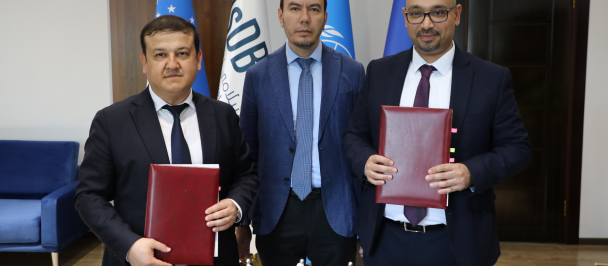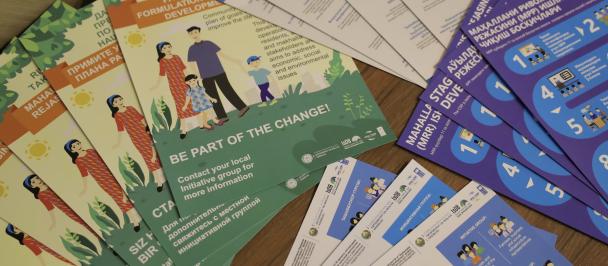Representatives of Central Asian countries and international partners exchange knowledge on uranium legacy sites remediation
November 27, 2023

Tashkent hosted a final knowledge exchange workshop within the framework of the regional project on “Stakeholder engagement in remediation of Uranium Legacy Sites in Central Asia. Phase 2”. The project is implemented in Kyrgyzstan, Tajikistan and Uzbekistan by UNDP and OSCE with financial support from the European Union.
Central Asia served as the main uranium supplier to the nuclear industry of the Soviet Union for nearly 40 years. With the collapse of the union the newly independent states had to face a major challenge in radioactive waste management. An estimated amount of around 1 billion tons of waste from mining and processing radioactive ores is stored on tailings sites and in mining waste dumps of functioning and abandoned uranium mines in Kazakhstan, Kyrgyzstan, Uzbekistan and Tajikistan. This poses a serious threat to livelihoods, human health, and the environment in the region.

To adress this problem UNDP and OSCE initiated a project, supported by EU. The objective of the project is to reduce risk of the negative impact of the uranium waste on people, livelihoods, and environment through raising awareness and supporting people-centred, gender sensitive, risk-informed solutions in legacy sites at the level of local communities in Tajikistan, Kyrgyzstan, and Uzbekistan.
Highlighting the importance of multilateral partnership, UNDP Deputy Resident Representative Mr. Anas Fayyad Qarman noted:
“I had a pleasure to visit Yangibad on early September as part of the mission of the ambassadors of European countries, UNDP, OSCE, EU Institutions, EBRD and get familiar with the results of the work on this topical issue. I would like to note the synergy in the actions of each of the parties. On the one hand, we witnessed large-scale work on recultivation, but also in parallel, work on the awareness raising of the local population and creation of socio-economic interventions. And, indeed, complex work can only be solved with an integrated approach, which I was a witness to.”

During the workshop, representatives of the involved countries presented the progress achieved and discussed the best practices and lessons learned from project implementation. In turn, active residents of uranium heritage areas shared their stories about how the project’s initiatives affected their lives and the lives of their community.
In Uzbekistan, the second phase of the project has been carried out since 2019 in Yangiabad and Charkesar. During this period, 16 business projects received funding for business development. Among them are a trekking camp, beekeeping businesses, a sewing workshop, a kindergarten, a training center and others.
In addition, over 100 individuals in Charkesar and Yangiabad have gained knowledge about initiating and managing businesses, as well as recognizing opportunities for green entrepreneurship in remote areas.

The project initiatives have also contributed to improving living conditions for the people of Yangiabad and Charkesar. The installation of seven transformer stations has provided power to 450 households in Yangiabad and 550 households in Charkesar. The project also involved the installation of 120 new radiation warning signs to alert the local population to potential risk areas.
Furthermore, the project procured dosimetry equipment and transferred it to the Ministry of Emergency Situations to facilitate radiation measurements for the local population and ensure safe habitation near uranium legacy sites. Residents of these sites can request a dosimeter and conduct independent radiation exposure measurements.

 Locations
Locations

